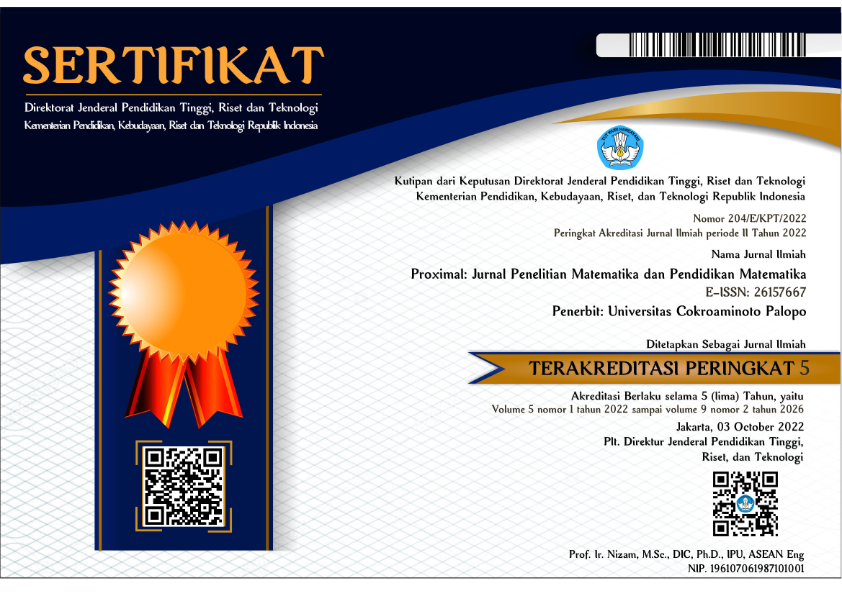Pengaruh Penerapan Model Pembelajaran Kooperatif Tipe Round Robin dengan Pendekatan Matematika Realistik Terhadap Hasil Belajar Matematika Siswa
DOI:
https://doi.org/10.30605/proximal.v8i4.7092Keywords:
Model Pembelajaran Kooperatif, Pendekatan Pendidikan Matematika Realistik, Hasil BelajarAbstract
Penelitian ini bertujuan untuk mengetahui pengaruh penerapan model pembelajaran kooperatif tipe round robin dengan pendekatan matematika realistik terhadap hasil belajar matematika siswa. Urgensi penelitian ini didasarkan pada rendahnya hasil belajar matematika siswa Indonesia yang ditunjukkan oleh studi internasional seperti PISA dan TIMSS, serta masih dominannya pembelajaran yang berpusat pada guru sehingga siswa kurang aktif dan kesulitan memahami konsep matematika secara mendalam. Penelitian ini merupakan penelitian pra-eksperimen dengan desain one group pretest-posttest design. Populasi penelitian ini adalah seluruh siswa Kelas X SMAN 2 Bulukumba. Teknik pengambilan sampel dilakukan dengan cluster random sampling menggunakan aplikasi spinner untuk mengundi kelas dari sembilan kelas yang ada, dan hasil undian menetapkan Kelas X-6 sebagai kelas eksperimen. Teknik analisis data yang digunakan adalah analisis statistik deskriptif dan analisis statistik inferensial. Hasil analisis statistik deskriptif menunjukkan peningkatan hasil belajar siswa dengan rata-rata posttest sebesar 84,81 (kategori tinggi) dan gain ternormalisasi sebesar 0,7 (kategori tinggi). Sementara itu, ketuntasan klasikal mencapai 96,29%, melebihi target kriteria ketuntasan minimal sebesar 75%. Uji hipotesis menggunakan one sample t-test dan proportion test mengonfirmasi bahwa hasil belajar mengalami peningkatan signifikan (Sig. < 0,05). Dengan demikian, model pembelajaran kooperatif tipe round robin dengan pendekatan matematika realistik terbukti berpengaruh positif terhadap hasil belajar matematika siswa. Oleh karena itu, disarankan agar guru menerapkan model ini sebagai alternatif strategi pembelajaran matematika yang kontekstual, dan penelitian lanjutan dapat mengembangkan media atau modul berbasis model tersebut untuk materi lain.
References
Ary, D., Jacobs, L. C., Sorensen, C. K., & Walker, D. A. (2014). Introduction to research in education (9th ed.). Wadsworth Cengage Learning.
Barz, N., Benick, M., Dörrenbächer-Ulrich, L., & Perels, F. (2023). The effect of digital game-based learning interventions on cognitive, metacognitive, and affective-motivational learning outcomes in school: A meta-analysis. Review of Educational Research. Advance online publication. https://doi.org/10.3102/00346543231167795 DOI: https://doi.org/10.3102/00346543231167795
Gravemeijer, K. (1994). Developing relistic mathematics eduaction. CD-β Press.
Hadi, S. (2017). Pendidikan matematika realistik. PT.RajaGrafindo Persada-Rajawali Pers.
Hake, R. R. (1998). Interactive-engagement versus traditional methods: A six-thousand-student survey of mechanics test data for introductory physics courses. American Journal of Physics, 66(1), 64–74. https://doi.org/10.1119/1.18809 DOI: https://doi.org/10.1119/1.18809
Hidayati, P., Safrizal, S., & Fadriati, F. (2023). Analisis faktor penyebab rendahnya hasil belajar matematika pada siswa kelas V sekolah dasar. Limas Pendidikan Guru Madrasah Ibtidaiyah, 4(1), 46–58. https://doi.org/10.19109/limas_pgmi.v4i1.15855 DOI: https://doi.org/10.19109/limas_pgmi.v4i1.15855
Inci, A. M., Peker, B., & Kucukgencay, N. (2023). Realistic Mathematics Education. In Current Studies in Educational Disciplines 2023 (pp. 66–83). ISRES Publishing.
Kagan, S., & Kagan, M. (2009). Cooperative learning. Kagan Publishing. http://www.kaganonline.com/
Linggih, I. K., Duma, S. Y., & Lambu’, R. (2023). Pengaruh model pembelajaran kooperatif tipe round robin terhadap hasil belajar matematika. PROSIDING SEMINAR NASIONAL PENDIDIKAN MATEMATIKA UKI TORAJA, 160–165.
Mbagho, H. M., & Tupen, S. N. (2020). Pembelajaran matematika realistik dalam meningkatkan hasil belajar matematika materi operasi bilangan pecahan. Jurnal Basicedu, 5(1), 121–132. https://doi.org/10.31004/basicedu.v5i1.632 DOI: https://doi.org/10.31004/basicedu.v5i1.632
Mullis, I. V. S., Martin, M. O., Foy, P., Kelly, D. L., & Fishbein, B. (2020). TIMSS 2019 international results in mathematics and science. TIMSS & PIRLS International Study Center, Lynch School of Education, Boston College. https://timss2019.org/download
Nasrullah, A., Marlina, M., & Tabrani, M. B. (2017). Pengembangan Perangkat Pembelajaran College Student Worksheet Berbasis E-Learning Melalui Edmodo. Seminar Nasional Riset Terapan 2017 (SENASSET 2017), 242–246.
OECD. (2023). PISA 2022 results (volume I): The state of learning and equity in education. OECD. https://doi.org/10.1787/53f23881-en DOI: https://doi.org/10.1787/53f23881-en
Rahman, A. (2018). Efektifitas media roda bangun datar dengan model kooperatif tipe. Issues in Mathematics Education, 2(1), 35–42. https://doi.org/10.35580/imed9479
Slavin, R. E. (2006). Educational psychology: Theory and practice (8. ed). Pearson Education.
Tarigan, R. (2021). Perkembangan matematika dalam filsafat dan aliran formalisme yang terkandung dalam filsafat matematika. Sepren, 2(2), 17–22. https://doi.org/10.36655/sepren.v2i2.508 DOI: https://doi.org/10.36655/sepren.v2i2.508
Zulkardi. (2002). Developing a learning environment on realistic mathematics education for Indonesian student teachers (Doctoral dissertation, University of Twente). PrintPartners Ipskamp.
Downloads
Published
Issue
Section
License
Copyright (c) 2025 Putri Ayu Aqilah, Hisyam Ihsan, Syahrullah Asyari

This work is licensed under a Creative Commons Attribution 4.0 International License.
In submitting the manuscript to the journal, the authors certify that:
- They are authorized by their co-authors to enter into these arrangements.
- The work described has not been formally published before, except in the form of an abstract or as part of a published lecture, review, thesis, or overlay journal.
- That it is not under consideration for publication elsewhere,
- That its publication has been approved by all the author(s) and by the responsible authorities – tacitly or explicitly – of the institutes where the work has been carried out.
- They secure the right to reproduce any material that has already been published or copyrighted elsewhere.
- They agree to the following license and copyright agreement.
License and Copyright Agreement
Authors who publish with this journal agree to the following terms:
- Authors retain copyright and grant the journal right of first publication with the work simultaneously licensed under Creative Commons Attribution License (CC BY 4.0) that allows others to share the work with an acknowledgment of the work's authorship and initial publication in this journal.
- Authors are able to enter into separate, additional contractual arrangements for the non-exclusive distribution of the journal's published version of the work (e.g., post it to an institutional repository or publish it in a book), with an acknowledgment of its initial publication in this journal.
- Authors are permitted and encouraged to post their work online (e.g., in institutional repositories or on their website) prior to and during the submission process, as it can lead to productive exchanges, as well as earlier and greater citation of published work.















